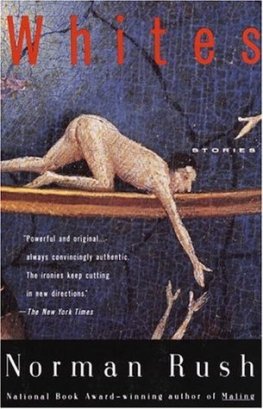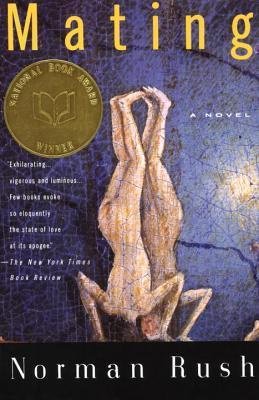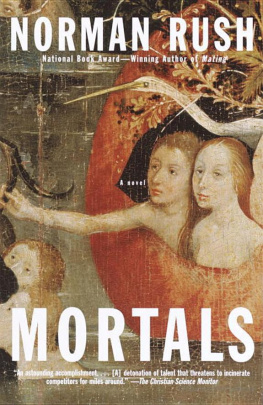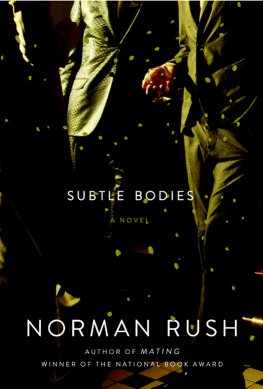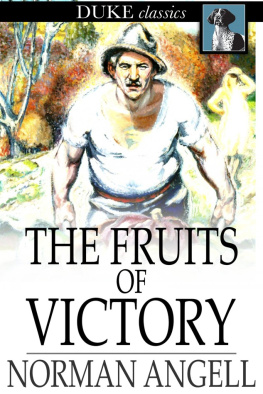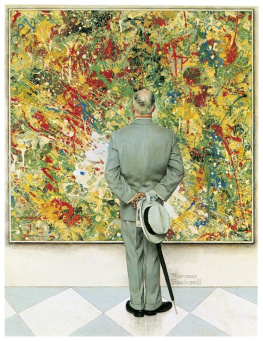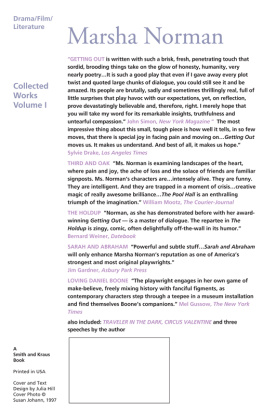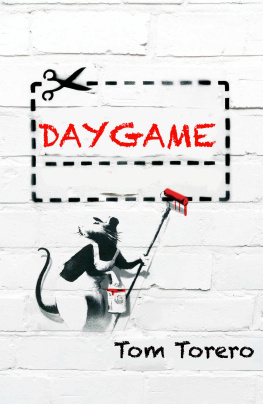PRAISE FOR NORMAN RUSHS WHITES
A haunting glimpse of individuals in the grip of passions and history.
Time
Whites is a collection of six low-keyed yet forceful stories set in Botswana. There is evidence in them of those who have gone before Evelyn Waugh, Graham Greene, William Boyd.
Jonathan Yardley, Washington Post
Superbly written Rush uncovers with grace, good humor and intelligence the sinuous complexities of the white mans experience of Africa. Its the books sense of well-timed voyeurism that pleases the sense of looking into the lives of individuals at precisely those moments where they reveal the most about themselves and about the culture that shaped them.
St. Petersburg Times
Rush has a brilliant eye for landscape [and] is a master at plot.
Nation
Whites shows Rush at his astringent best but even more, it represents one of those rare confluences of a particular witness, a historical moment, and an exotic locale that have created such earlier one-and-for-all copyrighted milieus as Isherwoods Berlin or Maughams South Sea Islands. Norman Rushs Botswana is as keenly seen, as memorably imagined.
Tom Disch
A profound and splendid collection of stories about modern Africa that demands to be read slowly and regarded weightily It is impossible to name favorites here; they are all brilliant, angry, careful, serenely wise stories.
John Calvin Batchelor
For Elsa, beautiful and good,
perfect friend, with gratitude
Poor Bruns. They hated him so much it was baroque. But then so is Keteng baroque, everything about it.
Probably the Boers were going to hate Bruns no matter what. Boers run Keteng. Theyve been up there for generations, since before the Protectorate. When independence came, it meant next to nothing to them. They ignored it. Theyre all citizens of Botswana, but they are Boers underneath forever, really unregenerate. Also, in Keteng youre very close to the border with South Africa. They still mostly use rands for money instead of pula. Boers slightly intrigue me. For a woman, Im somewhat an elitist, and hierarchy always interests me. I admit these things. The Boers own everything in Keteng, including the chief. They wave him to the head of the queue for petrol, which he gets for free, naturally, just like the cane liquor they give him. They own the shops. Also they think they really know how to manage the Bakorwa, which actually they do. You have to realize that the Bakorwa have the reputation of being the most violent and petulant tribe in the country, which is about right. All the other tribes say so. And in fact the Boers do get along with them. In fact, the original whites in Keteng that would be the Vissers, Du Toits, Pieterses seven families altogether were all rescued by the Bakorwa when their ox wagons broke down in the desert when they were trekking somewhere. They started out as bankrupts and now they own the place. Its so feudal up there you cannot conceive. That is, it has been until now.
I know a lot about Keteng. I got interested in Keteng out of boredom with my project. Actually, my project collapsed. My thesis adviser at Stanford talked me into my topic anyway, so it wasnt all that unbearable when it flopped. At certain moments I can even get a certain vicious satisfaction out of it. Frankly, the problem is partly too many anthropologists in one small area. We are thick on the ground. And actually we hate each other. The problem is that people are contaminating one anothers research, so hatred is structural and I dont need to apologize. At any rate, I was getting zero. I was supposed to be showing a relationship between diet and fertility among the Bakorwa up near Tswapong, in the hills. The theory was that fertility would show some seasonality because the diet in the deep bush was supposedly ninety per cent hunting-gathering, which would mean sharp seasonal changes in diet content. But the sad fact is you go into the middle of nowhere and people are eating Simba chips and cornflakes and drinking Castle lager. The problem is Americans, partly. Take the hartebeest domestication project, where they give away so much food and scraps and things that you have a kind of permanent beggar settlement outside the gate. And just to mention the other research people you have encumbering the ground you have me, you have the anthropologists from the stupid Migration Study and the census, and you have people from some land-grant college someplace following baboons around. By the way, there were several baboon attacks on Bakorwa gathering firewood around Keteng, which they blame on the Americans for pestering the baboons. Or Imiricans, as the Boers would say. America gets the blame.
The other thing is that Keteng is remote. Its five hours from the rail line, over unspeakable roads, through broiling-hot empty thornveld. In one place theres no road and you just creep over red granite swells for a kilometer, following a little line of rocks. So the Boers got used to doing what they wanted, black government or not. They still pay their farm labor in sugar and salt and permission to crawl underneath their cows and suck fresh milk. It is baroque. So I got interested in Keteng and started weekending. At my project site, camping was getting uncomfortable, I should mention, with strange figures hanging around my perimeter. Nobody did anything, but it makes you nervous. In Keteng I can always get a room from the sisters at the mission hospital and a bath instead of washing my armpits under my shirt because you never know whos watching.
The place I stay when I descend into Keteng is interesting and is one reason I keep going back. I can see everything from the room the sisters give me. The hospital is up on the side of a hill, and the sisters hostel is higher than that, on the very top. My room is right under the roof, the second story, where theres a water tank and therefore a perpetual sound of water gurgling down through pipes, a sound you get famished for in a place so arid. Also, in tubs on the roof they have vines growing that drape down over the face of the building, so you have this green-curtain effect over your window. The sisters have a little tiny enclosed locked-up courtyard where they hang their underthings to dry, which is supposed to be secret and sacrosanct, which you can see into from my room. You can also see where Bruns stayed a pathetic bare little shack near the hospital with gravel around the stoop and a camp stool so he could sit in the sun and watch his carrots wither. At the foot of the hill the one street in Keteng begins at the hospital gate and runs straight to the chiefs court at the other end of town. Downtown amounts to a dozen one-story buildings shops with big houses behind them. You can see the Bakorwa wards spreading away from the center of Keteng log kraals, mud rondavels with thatch, mostly, although cement-block square houses with sheet-metal roofs held down by cobbles are infiltrating the scene. Sometimes I think anthropology should be considered a form of voyeurism rather than a science, with all the probing into reproductive life and so forth we do. Im voyeuristic. I like to pull my bed up to the window and lie there naked, studying Keteng. Not that the street life is so exotic. Mostly its goats and cattle. I did once see a guy frying a piece of meat on a shovel. The nuns have really hard beds, which I happen to prefer.
Poor Bruns. The first thing I ever heard about him was that there was somebody new in Keteng who was making people as nervous as poultry, as they put it. Thats an Afrikaans idiom. They meant Bruns. He was a volunteer from some Netherlands religious outfit and a conscientious objector like practically all the Dutch and German volunteers are. He was assigned to be the fleet mechanic at the mission hospital. He was a demon mechanic, it turned out, who could fix anything. Including the X-ray machine, for example, which was an old British Army World War I field unit, an antique everybody had given up on. Of course, what do the Boers care, because when they get even just a little cut its into the Cessna and over the border into the Republic to Potgietersrust or even Pretoria. But other people were ecstatic. Bruns was truly amazing. People found out. A few of the Bakorwa farmers have tractors or old trucks, and Bruns, being hyper-Christian, of course started fixing them up for free in his spare time. On Saturdays youd see Bakorwa pushing these old wrecks, hordes of them pushing these three or four old wrecks toward Keteng for Bruns. So, number one, right away that made Bruns less than popular around Du Toits garage. Du Toit didnt like it. It even got a little mean, with some of Brunss tools disappearing from his workroom at the hospital until he started really locking things up.

